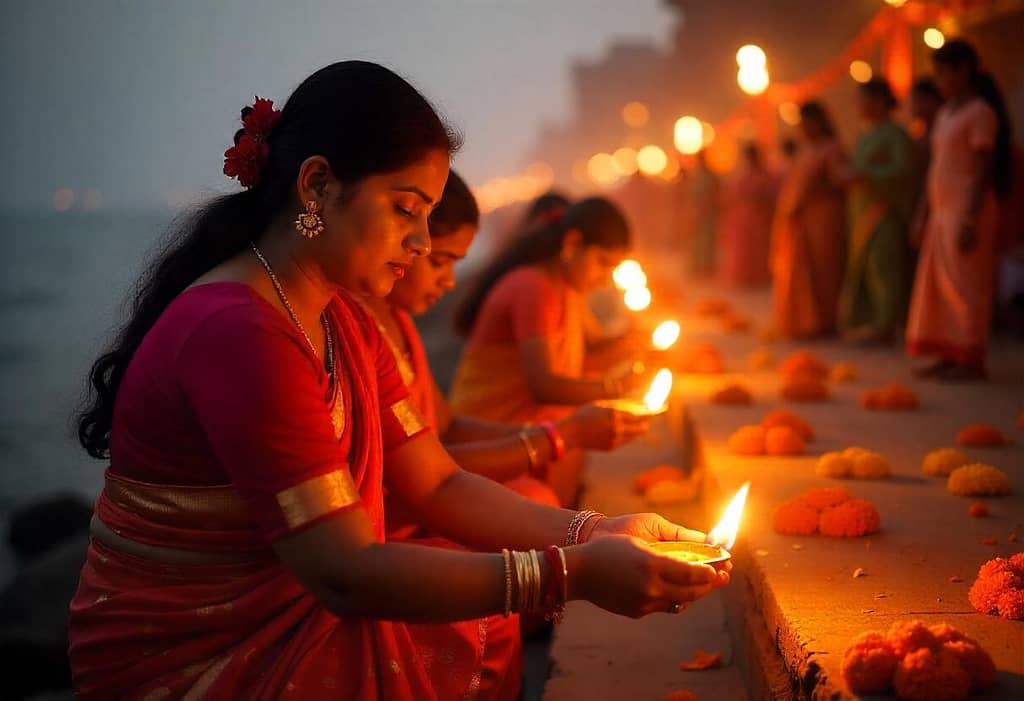
Dev Diwali, also known as “the Diwali of the Gods,” is a uniquely celebrated festival that lights up the sacred ghats of Varanasi, India, in honor of the divine. Unlike traditional Diwali, which falls in the Hindu month of Kartik, Dev Deepawali is observed fifteen days after Diwali, on Kartik Purnima (the full moon night). This event marks a significant spiritual moment as it is believed that, on this day, deities descend from heaven to take a dip in the holy Ganges and witness the illumination of thousands of oil lamps set along the riverbanks.
Here, we’ll explore the cultural, spiritual, and communal significance of Dev Deepawali, and why it draws not only local devotees but also thousands of visitors from around the world.
Origins of Dev Deepawali
The history of Dev Deepawali stretches back to ancient times and is rooted in Hindu mythology. According to legend, it commemorates the victory of Lord Shiva over the demon Tripurasura. After defeating the demon, the gods are believed to have come to the banks of the Ganges to celebrate this triumph. Over time, this festival evolved to include the lighting of diyas (oil lamps), symbolizing the triumph of light over darkness, good over evil, and divine blessings over worldly concerns.
Kartik Purnima also holds special significance in Hinduism as it marks the end of Chaturmas, a four-month period considered inauspicious for major religious activities and weddings. On this day, the deities, having completed their rest during Chaturmas, awaken and bestow blessings upon their devotees.
The Grand Celebration in Varanasi
In Varanasi, Dev Deepawali is celebrated with unparalleled fervor. Preparations begin days in advance, and on the auspicious evening, the ghats of Varanasi come alive with the soft, flickering glow of millions of diyas placed meticulously along the steps, pathways, and even floating on the Ganges River itself. Each ghat has its own unique display, and local residents, priests, and volunteers gather to arrange the diyas, creating elaborate patterns and formations.
The festivities often include processions, traditional music, and dance performances. Priests and devotees perform the Ganga Aarti, a spectacular ritual that involves offering prayers to the Ganges with fire, incense, flowers, and conch shells. The ritual, with its synchronized movements and chants, creates a mesmerizing aura that can be felt even by those witnessing it for the first time. Tourists and pilgrims also take boat rides to view the spectacle from the water, a vantage point that allows for a panoramic view of the illuminated ghats.
Spiritual Significance of Dev Deepawali
Dev Deepawali is more than just a visual spectacle; it is an invitation for spiritual introspection and devotion. As the Ganges River flows past the lit ghats, it becomes a reminder of the eternal journey of the soul and the continuity of life and time. For many devotees, participating in the rituals of Dev Deepawali is an act of purifying one’s karma and seeking divine blessings for the year ahead.
The act of lighting a diya holds immense symbolism. In Hindu tradition, light represents knowledge, wisdom, and divine consciousness. The diyas are believed to dispel not just physical darkness but also ignorance, misunderstandings, and ego, paving the way for inner enlightenment.
Community and Festivities Beyond Varanasi
Though Varanasi holds the most famous Dev Deepawali celebration, the festival is observed in many parts of North India, particularly along riverbanks and temples dedicated to Lord Shiva. The sense of community is profound as people come together, irrespective of age or background, to prepare the decorations, light the lamps, and sing devotional songs.
Families across towns and villages observe Dev Deepawali by lighting lamps in their homes and organizing community prayers. The festival is also a time for sharing sweets, performing acts of charity, and offering gratitude for the year’s blessings.
Modern Significance and Global Appeal
In recent years, Dev Deepawali has gained international recognition as travelers from around the world come to experience its unique blend of spirituality, tradition, and natural beauty. For visitors, witnessing the illuminated ghats of Varanasi offers not just a cultural experience but also a moment of tranquility and reflection. The festival is now an important event in Indian tourism, drawing photographers, travel bloggers, and spiritual seekers alike.
Moreover, Dev Deepawali serves as a reminder of the importance of preserving heritage and traditions. Despite the rapid pace of modernization, the festival continues to thrive, preserving its ancient rituals and passing on the sense of devotion and community to future generations.
Final Thoughts
Dev Deepawali is a festival that resonates deeply with anyone who experiences it, whether as a devoted Hindu or an intrigued visitor. It represents the essence of spirituality, community, and reverence for nature. As millions of lamps light up the night sky, the festival reminds us of the power of unity, devotion, and the undying light within us all.
For anyone seeking to explore Indian culture, spirituality, or simply witness a breathtaking celebration of lights, Dev Deepawali in Varanasi is an unforgettable experience. It’s a journey into the heart of India, a glimpse of the divine, and a celebration of the enduring beauty of life.